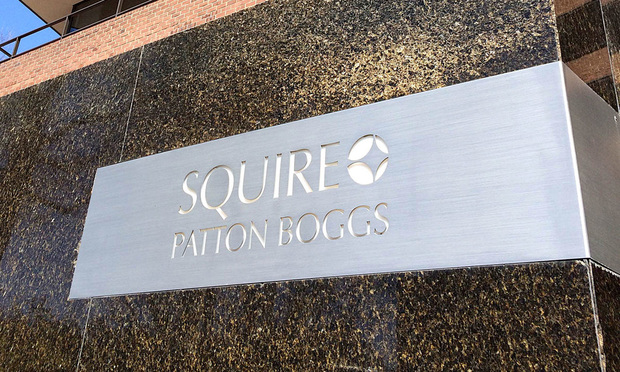Squire Patton Boggs Adds Int'l Arbitration Team From Curtis
While Curtis "punches above its weight," it had become harder to keep her practice going at the smaller firm, said ex-partner Miriam Harwood.
March 27, 2019 at 04:44 PM
3 minute read
 Photo: Mike Scarcella/ALM
Photo: Mike Scarcella/ALM
Squire Patton Boggs has added its second international arbitration partner from New York's Curtis, Mallet-Prevost & Mosle since the start of 2019, as part of a team that also includes a counsel and six associates.
Partner Ali Gursel follows Miriam Harwood, who joined Squire in New York earlier in March to become the co-head of the firm's international arbitration practice. For both attorneys, the core of their practice is investor treaty arbitration, representing states in cases brought by international investors.
Harwood spent over 25 years at Curtis, which she described as “punching above its weight,” but she said that it was becoming harder to carry on her work at the firm. While Curtis once was home to 320 lawyers, that number has dipped substantially. Data provided to The American Lawyer put the firm's head count at the end of 2018 at 277.
Curtis' revenue also dropped by over 12 percent in 2018, according to preliminary data from the firm, to $136 million. That may have increased the challenge of supporting lengthy arbitration battles, particularly on behalf of nation states with tight budgets that don't pay fees on the same schedule as deep-pocketed corporations.
“Squire has the platform and has the resources, so you can ride out the case,” Harwood said.
Her practice focuses on construction disputes, along with telecom and oil and gas fights.
In the past, Harwood has handled substantial work for the Venezuelan government in cases brought by U.S. oil companies, including a long-running $30 billion dispute with ConocoPhillips and a $16 billion dispute with Exxon Mobil Corp. She also represented Venezuela's national oil and gas company PDVSA in two commercial arbitrations brought by ConocoPhillips.
She is currently representing Libya in an $80 million case brought by the Austrian construction company over road-building projects disrupted by that country's revolution.
And she and Gursel are handling a number of matters on behalf of Turkmenistan, including a $750 million claim brought by Russian telecoms multinational Mobile TeleSystems.
Gursel, who was born in Turkey, was behind Curtis opening up a series of offices in Central Asia starting in the late 2000s. He led the Istanbul office when it opened in 2007, had a hand in an opening in the Kazakhstan capital of Astana in 2008, and then took the lead when the firm opened in Ashgabat, the capital of Turkmenistan, in 2011. According to Curtis's website, while it maintains offices in Astana and Almaty, the largest city in Kazakhstan, the Istanbul and Ashgabat offices are now closed.
Harwood drew a contrast between Squire and her previous firm. While the former has grown from its Cleveland roots to 47 offices in 20 countries primarily through two substantial mergers, first with the U.K.'s Hammonds in 2010 and then with Washington, D.C.-based Patton Boggs in 2014, Curtis has resisted the prospect of a combination.
“There are very few firms like Curtis, and they like to keep it that way,” she said. “I understand the allegiance to the old way of doing things, but this is the wave of the future.”
A spokeswoman from Curtis did not respond to a request for comment Wednesday.
This content has been archived. It is available through our partners, LexisNexis® and Bloomberg Law.
To view this content, please continue to their sites.
Not a Lexis Subscriber?
Subscribe Now
Not a Bloomberg Law Subscriber?
Subscribe Now
NOT FOR REPRINT
© 2025 ALM Global, LLC, All Rights Reserved. Request academic re-use from www.copyright.com. All other uses, submit a request to [email protected]. For more information visit Asset & Logo Licensing.
You Might Like
View All

Treasury GC Returns to Davis Polk to Co-Chair White-Collar Defense and Investigations Practice
2 minute read
Kirkland & Ellis Taps Former Co-Chair of Greenberg Traurig’s Digital Infrastructure Practice
3 minute read
Trending Stories
- 1In Novel Oil and Gas Feud, 5th Circuit Gives Choice of Arbitration Venue
- 2Jury Seated in Glynn County Trial of Ex-Prosecutor Accused of Shielding Ahmaud Arbery's Killers
- 3Ex-Archegos CFO Gets 8-Year Prison Sentence for Fraud Scheme
- 4Judges Split Over Whether Indigent Prisoners Bringing Suit Must Each Pay Filing Fee
- 5Law Firms Report Wide Growth, Successful Billing Rate Increases and Less Merger Interest
Who Got The Work
J. Brugh Lower of Gibbons has entered an appearance for industrial equipment supplier Devco Corporation in a pending trademark infringement lawsuit. The suit, accusing the defendant of selling knock-off Graco products, was filed Dec. 18 in New Jersey District Court by Rivkin Radler on behalf of Graco Inc. and Graco Minnesota. The case, assigned to U.S. District Judge Zahid N. Quraishi, is 3:24-cv-11294, Graco Inc. et al v. Devco Corporation.
Who Got The Work
Rebecca Maller-Stein and Kent A. Yalowitz of Arnold & Porter Kaye Scholer have entered their appearances for Hanaco Venture Capital and its executives, Lior Prosor and David Frankel, in a pending securities lawsuit. The action, filed on Dec. 24 in New York Southern District Court by Zell, Aron & Co. on behalf of Goldeneye Advisors, accuses the defendants of negligently and fraudulently managing the plaintiff's $1 million investment. The case, assigned to U.S. District Judge Vernon S. Broderick, is 1:24-cv-09918, Goldeneye Advisors, LLC v. Hanaco Venture Capital, Ltd. et al.
Who Got The Work
Attorneys from A&O Shearman has stepped in as defense counsel for Toronto-Dominion Bank and other defendants in a pending securities class action. The suit, filed Dec. 11 in New York Southern District Court by Bleichmar Fonti & Auld, accuses the defendants of concealing the bank's 'pervasive' deficiencies in regards to its compliance with the Bank Secrecy Act and the quality of its anti-money laundering controls. The case, assigned to U.S. District Judge Arun Subramanian, is 1:24-cv-09445, Gonzalez v. The Toronto-Dominion Bank et al.
Who Got The Work
Crown Castle International, a Pennsylvania company providing shared communications infrastructure, has turned to Luke D. Wolf of Gordon Rees Scully Mansukhani to fend off a pending breach-of-contract lawsuit. The court action, filed Nov. 25 in Michigan Eastern District Court by Hooper Hathaway PC on behalf of The Town Residences LLC, accuses Crown Castle of failing to transfer approximately $30,000 in utility payments from T-Mobile in breach of a roof-top lease and assignment agreement. The case, assigned to U.S. District Judge Susan K. Declercq, is 2:24-cv-13131, The Town Residences LLC v. T-Mobile US, Inc. et al.
Who Got The Work
Wilfred P. Coronato and Daniel M. Schwartz of McCarter & English have stepped in as defense counsel to Electrolux Home Products Inc. in a pending product liability lawsuit. The court action, filed Nov. 26 in New York Eastern District Court by Poulos Lopiccolo PC and Nagel Rice LLP on behalf of David Stern, alleges that the defendant's refrigerators’ drawers and shelving repeatedly break and fall apart within months after purchase. The case, assigned to U.S. District Judge Joan M. Azrack, is 2:24-cv-08204, Stern v. Electrolux Home Products, Inc.
Featured Firms
Law Offices of Gary Martin Hays & Associates, P.C.
(470) 294-1674
Law Offices of Mark E. Salomone
(857) 444-6468
Smith & Hassler
(713) 739-1250










